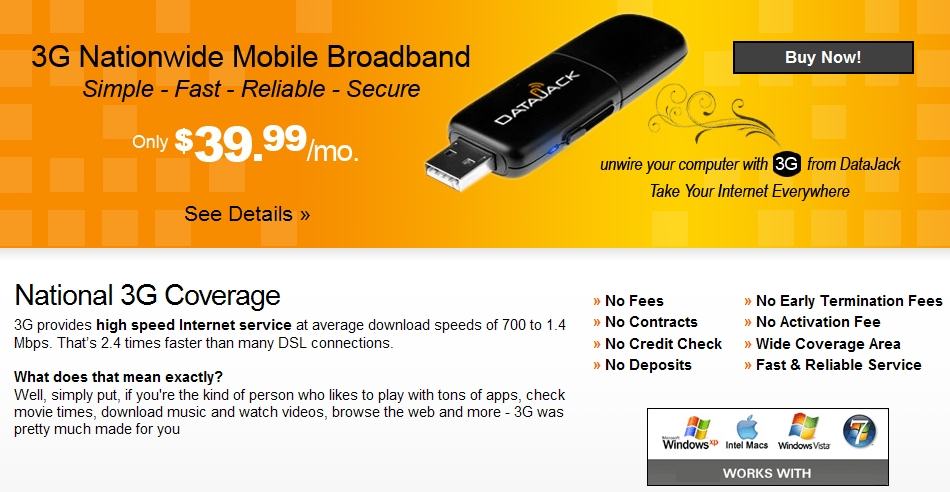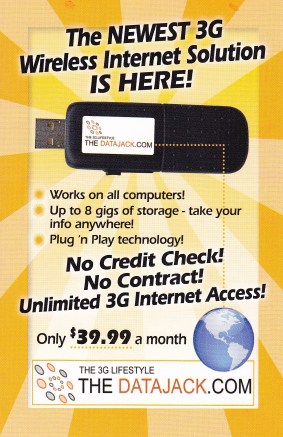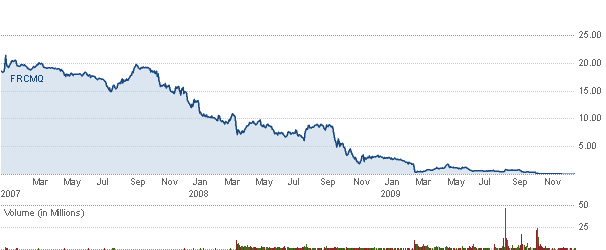DataJack, the 3G mobile broadband service that was promising unlimited wireless broadband service for $39.99 a month is back — with an all-new 5GB monthly usage cap, a new provider, and hassles for existing customers who must swap out their existing wireless modem.
Stop the Cap! first covered DataJack back in January, when customers were howling about the company’s lousy customer service and its tendency to “stretch the truth” about its coverage area, speeds, and even the availability of the product itself.
Rumors about a major spat between its original data service provider, presumably T-Mobile (based on the fact DataJack and T-Mobile had identical coverage maps back in January) and DataJack led the company to stop signing up new customers. Since January, DataJack’s website has told would-be customers that the wireless modem necessary to use it was “out of stock.”
DataJack remained in limbo until the first week of April, when the company began e-mailing updates to dealers and customers about major changes to the company and its marketing:
- “Unlimited” service is history, not that DataJack ever really offered it. Many customers who used the service in excess of 5GB per month were notified their account would be closed at the end of the month’s billing cycle. “Companies like DataJack have an English language comprehension problem,” writes Stop the Cap! reader Kevin. “The word ‘unlimited’ means ‘without limit,’ — a concept DataJack routinely ignored when throwing people off their service.” New customers will be subject to a formal 5 GB usage cap.
- Customers who did manage to get modems from DataJack may find they may no longer work after this Thursday. The company is dropping GSM-based network service and moving to a CDMA network (either Sprint or Verizon — most believe the former), which means obtaining a new modem. At least that will be offered free of charge to inconvenienced current customers.
- The price for new customers is going up $10 per month — to $49.99 for 5 GB of service. Existing customers get to retain service for $39.99 a month, albeit with the new usage cap. The DataJack website has still not been updated to reflect the new pricing.
Kevin is taking a walk far away from DataJack:
“These people don’t have the first clue how to run a business. Their entire marketing plan just a few months earlier was based on the premise of unlimited service. They apparently got into trouble with their provider, another sign that doesn’t inspire confidence, and now they’re e-mailing customers telling them they literally have days to complete an equipment swap or lose service? In the end, they were punishing people for actually believing their marketing nonsense about “unlimited” service and now they want people to believe a $10 price hike for less service is good news? After everything that has happened with these people since January, who knows what will happen next month. I’m not about to wait around to find out.”
Dealers were the first to be notified about the company changes. Stop the Cap! obtained this copy of a message sent to DataJack retailers:
Dear DataJack Dealer,
Please note that Effective April 2, 2010, the following changes were made to our terms and conditions:
Service Usage. We reserve the right to safeguard our network from abuse, excessive bandwidth consumption or any activity that compromises the performance of our network. We may limit throughput speeds, control the amount of data transferred, and suspend, modify or terminate service, without notice, if your usage adversely impacts our network or exceeds 5 GB in a given month. We may monitor your compliance with the above but will not monitor the content of your transmissions except as otherwise expressly permitted or required by law.
Prohibited Uses. The service may not be used in a manner that violates any law (including without limitation, copyright and intellectual property laws); or the Service Usage clause.
We have found it necessary to implement these measures to ensure our DataJack customers are given the opportunity to access reliable, high speed, wireless internet service at a reasonable price.
95% of our customers will not be impacted by these new provisions; however, if a customer who is impacted visits your store and requests a refund due to no longer having access to the service, please direct them to the DataJack customer support team at 1-888-693-4522. Our team will work directly with the customer to resolve the issue.
Additionally, we are in the process of rolling out a new and improved Dealer Portal. Benefits of this portal include a more user friendly interface, virtual training videos, and enhanced functionality. Our systems will be down for a short period of time while making the transition. Please refer to customer service to process pins and activations for your customers.
If you have any questions, please feel free to contact [email protected].

The "unlimited service" so prominently mentioned in January is gone from today's marketing of DataJack (click to enlarge)
Existing customers were next to be notified by this e-mail message sent last week:
Dear Valued Customer,
To address recent quality and connectivity issues, DataJack is migrating our service on April 15, 2010 to a new Tier 1 network which delivers faster data speeds and an expanded coverage area. The move to this new network means that DataJack must replace your existing device by April 15th to ensure uninterrupted service. Realizing this could be an inconvenience to you, DataJack is offering our customers a FREE MIFI unit for use as your replacement device at absolutely no extra charge (M.S.R.P. $299.00).
To ensure we get your replacement device to you in a timely manner, it is imperative that you verify the name and address we have on file for you as soon as possible by replying to this email. The name and address on file is as follows:
(address removed)
Upon verifying your address, we will send your new WIFI unit and a postage paid return envelope so you may mail back your current DataJack device. We ask that you please return the used device within 10 business days. South Florida customers also have the option of exchanging their device on April 14th, 15th, and 16th from 10AM – 9PM EST at the following location: 6365 NW 6th Way Suite 160 Fort Lauderdale, FL 33309.
If you do not want to take advantage of the FREE MIFI unit offer, please contact customer service at 1-888-693-4522 to discuss alternative equipment options.
Please note that new customers will be required to pay $49.99 per month for service. This price increase will not affect you, your service fee will continue to be $39.99 per month. Additionally, we have changed our terms and conditions to include service usage and prohibited uses clauses. The terms and conditions apply to all customers.
Again, time is of the essence. We must get your new unit to you by April 15th to avoid service interruption. Thank you for your patience and we look forward to serving you on our new and improved network.
Best Regards,
The DataJack Team
Here is how DataJack dispenses with customers who use their “unlimited” service “too much”:
Dear DataJack Customer,
In accordance with our terms and conditions, more specifically the Service Usage and Prohibited Usage clauses, we are unable to renew your service upon expiration.
We regret that we can no longer provide service and wish you the best in finding a new provider for your wireless internet access needs. Our customer service representatives are available 8AM – 5PM Monday through Friday to address any questions you may have.
Best Regards,
DataJack, Inc.
888-693-4522Under Terms & Conditions
Effective April 2, 2010
Service Usage. We reserve the right to safeguard our network from abuse, excessive bandwidth consumption or any activity that compromises the performance of our network. We may limit throughput speeds, control the amount of data transferred, and suspend, modify or terminate service, without notice, if your usage adversely impacts our network or exceeds 5 GB in a given month. We may monitor your compliance with the above but will not monitor the content of your transmissions except as otherwise expressly permitted or required by law.


 Subscribe
Subscribe









